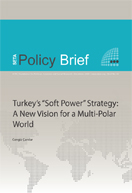Chief of General Staff Gen. Ä°lker BaĹźbuÄź delivered an unprecedented speech on Tuesday. Given its tone, arguments and scope, BaĹźbuÄź's speech may herald the beginning of a new era in civilian-military relations in Turkey.
In his long and well-prepared speech, BaĹźbuÄź outlined the views of the Turkish Armed Forces (TSK) on the key challenges Turkey is facing in the 21st century. And here lies a big irony: While BaĹźbuÄź delivered probably the most progressive speech ever by any chief of general staff, he spoke like a political leader or head of state. The speech was carefully balanced on the major issues, including the future of the nation-state, democracy, the Kurdish issue and secularism. Yet again, he spoke with an entitlement to address everything from history to politics and society. The hall in which he spoke was packed with soldiers, journalists, academics and civil society representatives. All major national TV stations broadcast the speech live with "breaking news" headlines and comments. After the speech, scores of commentators discussed BaĹźbuÄź's messages. And now I am writing my column on the same theme. The speech made all the headlines and news hours across the country; BaĹźbuÄź got more attention in one day than President Gül, Prime Minister ErdoÄźan, the parliament speaker or opposition leaders put together. This is a scene not observed in any mature democracy. But I guess this is the irony of Turkish democracy in the 21st century. While the TSK has come a long way in its troubled history with democracy and civilian government, it continues to see itself as the guardian of the republic. In principle, there is nothing wrong with that except for the fact that the army has a very specific and narrow notion of the founding principles of the republic. Furthermore, it always sees all other actors, including politicians and NGOs, as weak on national security and by extension unreliable for the future of the country. To his credit, Gen. BaĹźbuÄź expressed more confidence in civilian politics and the Turkish Parliament than any other chief of general staff on record. Yet the culture of mistrust that exists between the military and the government is no secret.
With this caveat in mind, BaĹźbuÄź's speech represents a major change in the way Turkish generals think and speak about the key issues of the country and the region. Unlike the speeches given by most of his predecessors, BaĹźbuÄź did not use aggressive and patronizing language to attack the government. To the contrary, he deferred to the government in relation to some burning issues, including the Kurdish question. He repeated the commitment of the TSK to democracy and the rule of law. He used arguments and quotes from social scientists, including Max Weber and Professor Metin Heper, a Turkish political scientist. As a matter of fact, parts of his speech could have been delivered by an academic. I think this was a message, too: The Turkish army holds a certain position on issues because it has arguments to support it, not because it has a gun around its waist. BaĹźbuÄź also referred to President Obama's speech in the Turkish Parliament last week, which shows that he and his colleagues have been following the developments closely. Additionally, BaĹźbuÄź was clearly impressed by Obama's speech, from which he quoted several times. The bulk of the speech was devoted to the foundations and future of the Turkish state and its relation with the diverse peoples that make up the modern Turkish Republic. BaĹźbuÄź spent a good part of his talk on the Kurdish issue because he seems to believe that the Kurdish issue is not only a matter of national security but also a test for the success or failure of Turkish integration and modernization. He insisted that the Turkish state has never tried to assimilate its citizens and in particular the Kurds or, as he put it, "the citizens of Kurdish origin." He also insisted that we must distinguish between the Kurdish people and the Kurdistan Workers' Party (PKK) terrorism, a point he has made in the past. What was most unu








